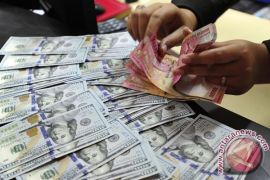This is something we have to be wary about."Jakarta (ANTARA News) - Indonesia is set to keep its inflation from exceeding the target of 7.2-7.8 percent this year as set in the revised 2013 state budget.
Bank Indonesia and the government will coordinate to keep inflation under control, Agus Martowardojo, the central bank governor said here on Wednesday.
"I will welcome coordination meetings with the government including regional administrations on way to control inflation below 8 percent," Agus said after a meeting on stabilization of the prices of essential goods with government officials.
However, he said his first concern is July`s inflation, which is predicted to exceed 2.38 percent.
"This is something we have to be wary about. There are still a number of days until the end of July . We all know that in September inflation would be low," he said.
He said estimated inflation of 2.38 percent in July is still within controllable level in line with the revised 2013 state budget.
He warned, however, that inflation could surge again toward the end of the year.
He said the high prices of essential goods in the second quarter also had their impact on the current account balance, but his estimate was the country had a current account surplus in the second quarter.
"As I see it, after the rise in the prices of subsidized oil fuels, corporate demand for US dollar was met in June," he said, adding,"we are now entering the month of July when demand for dollar is not that high."
Demand for dollar from dollar holding investors also declined with foreign shareholders quitting the stock market, he added.
Rupiah would regain strength if inflation is kept under control and foreign exchange deficit is not too big, he said.
Agus said he hoped in the coming months there will be inflows of foreign capital to country with the decision of the government to issue state bonds.
"The government is aware that it is a bit too expensive, but I am confident there will be incoming flows. However, we must remain on guard about developments in the United States," he said.
He also sought to convince the people that there is no cause for too much worry with the rupiah fall in value to cross the level of 10,000 per dollar.
"Exchange rate is temporary. It was the same as in 2005 and 2008 when the prices of oil fuels were raised. At that time the country`s foreign exchange reserves were not as big as now," he said.
He said analysis is needed of exports of a number of commodities to prevent imported inflation, pointing to 12 percent contraction in exports of commodities outside oil and gas.
"Last year exports of commodities other than oil and gas shrank by 18 percent. Therefore, we have to be ready to face further fall in export earning that could affect the state income," he said.
In order to cope with the problem, he called for diversification of export market immediately.
(Uu.H-ASG/H-YH)
Editor: Priyambodo RH
Copyright © ANTARA 2013









